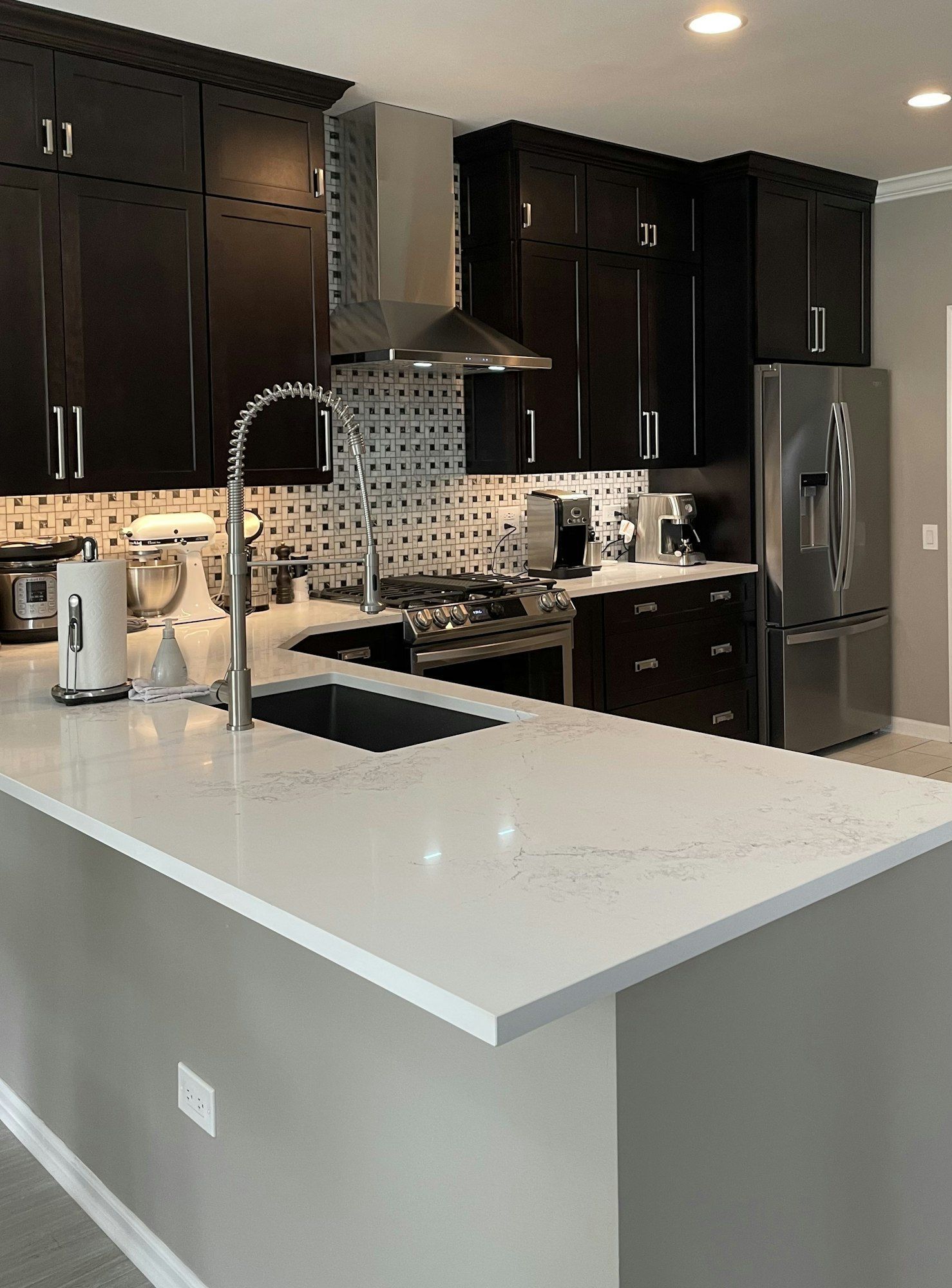The kitchen countertop is a pivotal part of your kitchen’s design. It not only provides a work surface for meals but also contributes significantly to the aesthetic appeal of your kitchen. The material of your countertop is a significant aspect to consider, as it will determine its durability, maintenance, and aesthetic appeal. Today, you can choose from various materials like granite, quartz, marble, and other natural stones. This article will guide you on how to select the best material for your kitchen countertop with a focus on durability and aesthetics.
Granite Countertops: Timeless Beauty with Durability
Granite is a popular choice for kitchen countertops due to its natural beauty and durability. Formed from hot magma, granite is a tough and heat-resistant natural stone. It offers a unique blend of aesthetics and functionality.
This might interest you : Is it worth investing in a boiling water tap for your UK kitchen?
Granite countertops offer a wide range of colors and patterns, each slab having its unique design. From classic whites and blacks to vibrant blues and greens, granite provides multiple options for you to choose from.
Granite is highly resistant to heat, making it an excellent choice for kitchens. It can withstand hot pots and pans without suffering any damage. However, it requires regular sealing to prevent staining and ensure longevity. It’s relatively easy to clean, with mild soap and water often being enough to maintain its shine.
Also to see : What kitchen lighting trends are currently popular in the UK?
Quartz Countertops: A Blend of Durability and Design Flexibility
Quartz is a manufactured stone, made from a combination of crushed quartz and resins. It’s one of the most durable kitchen countertop materials available in the market. It’s non-porous, meaning it doesn’t absorb liquids and is resistant to staining.
Unlike natural stone options, quartz offers a wider range of design possibilities. Since it’s a manufactured material, it’s available in a vast array of colors and patterns. You can even find quartz that mimics the look of natural stones like marble and granite.
The combination of durability and design flexibility makes quartz an excellent choice for both traditional and contemporary kitchen styles. Just like granite, it’s resistant to heat, although using trivets is recommended to avoid any potential damage. In terms of maintenance, quartz is easy to clean and doesn’t require any sealing.
Marble Countertops: The Epitome of Elegance and Luxury
Marble, a metamorphic stone formed from limestone subjected to heat and pressure, is synonymous with luxury and elegance. Its unique veining patterns and warm tones make it a coveted choice for kitchen countertops.
Marble countertops are available in a wide range of colors, including white, black, green, and rose. Each slab of marble is unique, meaning your countertop will have a distinct design.
While marble is undeniably beautiful, it’s a softer stone and is more prone to scratches and staining. It’s also sensitive to acidic substances like lemon juice or vinegar. Therefore, marble countertops require regular sealing and careful maintenance. However, for those who value aesthetics above all else, the natural beauty of marble might justify the extra care required.
Natural Stone vs. Manufactured Materials: A Comparison
When choosing between natural and manufactured materials for your kitchen countertop, it’s essential to weigh the pros and cons. Natural stones like granite and marble are unique and bring a touch of nature into your kitchen. They’re durable and heat-resistant but require regular maintenance to keep them in pristine condition.
On the other hand, manufactured materials like quartz offer a blend of durability and design flexibility. They’re virtually maintenance-free and offer an extensive array of design options. However, they might lack the unique charm of natural stones.
Making the Right Choice: Factors to Consider
Choosing the right countertop material for your kitchen involves considering several factors. First, evaluate your lifestyle and usage patterns. If your kitchen is a high-traffic area and you cook frequently, you might want to opt for materials with high durability and heat resistance, like granite or quartz.
Next, consider the aesthetic appeal. The color and design of your countertop should complement your kitchen’s overall design theme. Lastly, factor in the maintenance. Some materials require more care than others. If you prefer a low-maintenance option, quartz might be a better choice over marble.
Remember, the ‘best’ countertop material is subjective and depends on your personal preferences and needs. It’s about finding the right balance between durability, aesthetics, and maintenance.
Solid Surface and Laminate Countertops: Affordability and Versatility
Solid surface and laminate countertops are both cost-effective options that offer a great deal of versatility in terms of design. They are manufactured materials, making them a fitting choice for homeowners who seek a wide array of colors and patterns to match their kitchen design.
Solid surface countertops are made from a blend of natural minerals and acrylic resins. This combination results in a non-porous, seamless finish that is resistant to stains and bacteria. The material is also repairable; minor scratches and burns can be buffed out. However, it’s less heat resistant compared to natural stone and quartz countertops, so the use of trivets is essential to prevent damage from hot pots and pans.
On the other hand, laminate countertops are constructed with a plastic laminate layer bonded to a particleboard or plywood base. They are available in numerous colors, patterns, and finishes, including options that mimic the look of natural stone, wood, and concrete. Laminate countertops are easy to clean and maintain; however, they aren’t as durable as other options. They can chip or scratch, and unlike solid surface countertops, these damages can’t be repaired.
Solid surface and laminate countertops significantly differ in their durability and maintenance requirements. However, both materials offer affordable and versatile solutions for homeowners who are working within a budget or looking to match a specific kitchen design.
Butcher Block and Concrete Countertops: Rustic Charm and Industrial Cool
Two other options for kitchen countertops are butcher block and concrete countertops. Both materials provide unique aesthetic appeal and can be a striking feature in your kitchen design.
Butcher block countertops are made from straight cuts of wood that are glued together to form a sturdy work surface. They bring a warm, rustic charm to a kitchen and are perfect for those who love to cook, as they’re excellent for chopping and slicing. However, they require regular maintenance to prevent damage from water and heat. Regular oiling is necessary to maintain the richness of the wood and to prevent it from drying out.
Concrete countertops, meanwhile, offer an industrial and contemporary look. They’re incredibly durable and heat resistant, much like granite and quartz countertops. Concrete can be cast in any shape and size, and pigments can be added to the mix to create a wide range of colors. Despite these advantages, concrete is porous and requires regular sealing to prevent stains.
When considering these kitchen countertop materials, it’s vital to weigh the aesthetic appeal, maintenance requirements, and durability against your lifestyle and design preferences.
Conclusion: Selecting the Right Countertop for Your Kitchen
Choosing the right countertop material for your kitchen is a crucial decision that can significantly affect the functionality, aesthetic appeal, and maintenance of your space. From natural stones like granite and marble to manufactured materials like quartz, solid surface, and laminate, each option presents its unique set of benefits and drawbacks.
When making your selection, consider your lifestyle and the amount of maintenance you’re willing to undertake. If you frequently use your kitchen for cooking, opt for a heat resistant and durable material like granite, quartz, or concrete. If aesthetics are your primary concern, materials like marble, butcher block, or even laminate offer a wealth of design options to suit your kitchen design.
In the end, the best kitchen countertop material is one that matches your personal preferences, lifestyle, and budget. Remember, it’s not just about choosing the most durable or the most aesthetically pleasing material; it’s about finding the balance between these factors to create a kitchen space that you’ll love for years to come.






